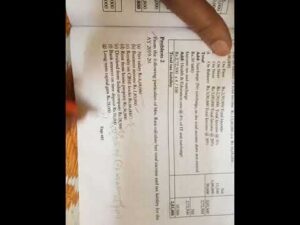Content
However, no action can substitute for a conservative and meticulous handling of all your tax filing, payment, and disclosure obligations by a tax professional. There are several reasons the Internal Revenue Service (IRS) may determine that it is necessary to conduct a tax audit. The IRS may select you for an audit due to suspicious errors or discrepancies on your tax returns, because you are self-employed, or simply choose you at random using a computer algorithm. If you are concerned about an anticipated or recently initiated IRS audit, you should contact an experienced Roseville tax audit accountant for assistance as soon as possible.
For instance, the payments must be made under a divorce or separate maintenance decree or written separation agreement. And the payer’s liability for the payments must end when the former spouse dies. You’d be surprised how many divorce decrees run afoul of this rule. If the IRS auditor is making a lot of adjustments to your return, he or she will often dig in and look for more. This higher scrutiny often means that the auditor will open other tax years, so you’ll spend more time under audit. It’s easier and less stressful to stay ahead of the curve and get professional help from someone who has experience with small business taxes.
How far back can the IRS audit you?
If a taxpayer files a fraudulent return, the statute of limitations is unlimited. This means that even if certain errors were reported and not audited within the original three-year audit window, the IRS can include those findings in the current audit. An audit can involve targeted questions and requests of proof of particular items only. Alternatively, audits can cover the waterfront, asking for proof of virtually every line item. Even if you do your best with your taxes, taxes are horribly complex. Innocent mistakes can sometimes be interpreted as suspect, and digging into the past is rarely pleasant.

In law, a “statute of limitations” is a deadline for a certain procedure to be initiated – for example, a prosecutor filing criminal charges, or an injury victim filing a claim. With regard to audits, extending the statute of limitations gives the IRS more time to assess tax. Be advised that the IRS does not call taxpayers concerning audits. If you receive a phone call or automated message from a person claiming to be an IRS agent, do not share any of your personal or financial information, or you may fall victim to a costly scam.
The IRS pursues penalties
Be prepared to show how and why you received that money if you file a tax return. All these information forms are fed into DIF, so make sure your tax return includes all of this information. The IRS has audited fewer https://kelleysbookkeeping.com/ returns since 2010 due to federal budget cuts that have affected staff size. According to a 2022 General Accounting Office report, only 0.25% of all individual returns were audited in 2019, down from 0.9% in 2010.
- It usually prompts the IRS to send a notice assessing extra taxes, without taking the time to thoroughly review your explanation of why you do not owe more.
- The second situation occurs when the IRS has knowledge and information that a person may have acted fraudulently.
- It’s based on 100% of the first $2,000 spent on qualifying college expenses and 25% of the next $2,000.
- However, the IRS cannot audit you for a particular tax year again, unless you or the Secretary of the Treasury request the new audit.
- For some individuals who typically lean towards “shadier” tax practices, their chance of being audited is significantly higher.
Six years is a long time, and the IRS has no time limit if you never file a return or file fraudulently. Another scary rule is that the IRS can audit forever if you omit certain tax forms. They include Form 5471 if you own part of a foreign corporation, Form 3520 for gifts or inheritance from foreign nationals, and Form 8938 for overseas assets. Once a tax assessment is made, the IRS collection statute is typically ten years. The tax filing and tax payment requirements are actually separate obligations. In most cases, small business owners must file tax returns each year — regardless of whether they ultimately owe taxes to the IRS.
Office audits usually move quickly
Beyond the enforcement focus, Acting Assistant Attorney General Caroline Ciraolo revealed that the Department of Justice’s Tax Division averages around 6,000 active matters. These cases are worked by approximately 340 attorneys, who are successful in more than 95 percent of the cases they prosecute. Generally, the IRS will audit returns from the past three years. If auditors discover a substantial issue, they may increase the audit scope to include additional years.
- Working with a credible tax professional, however, may be your best line of defense when it comes to IRS audits.
- If you owe additional tax and/or penalties, you will also owe interest.
- In this area of the tax law, the rules for corporations, partnerships, nonprofit organizations, and individuals are consistent.
- The IRS will compare your itemized deductions to the average total deductions for a given item claimed by other taxpayers who are in the same income range as you.
- If your tax return is due April 15, but you file early, the statute runs exactly three years after the due date, not the filing date.
There is a statute of limitations for how much time the IRS has to impose additional taxes—typically three years after a return is due or was filed, depending on which is later. These often involve in-person interviews and is a much more extensive process, where the IRS is ordinarily seeking quite a bit of information. Depending on the results of a correspondence audit by mail, it could evolve into an IRS Office Audit and an interview. The basic rule for the IRS’ ability to look back into the past and conduct a tax audit is that the agency has three years from your filing date to audit your tax filing for that year. However, taxpayers who fail to include all sources of their income may face a longer time period.
The IRS will be hard pressed to keep this promise, but it’s too soon to know for sure. You (or your tax pro) will meet with the IRS agent at an IRS office. The IRS usually starts these audits within a year after you file the return, and wraps them up within three to six months. But expect a delay if you don’t provide complete information or if the auditor finds issues and wants to expand the audit into other areas or years.
He has also appeared on the Oprah Winfrey Show and is the author of two books. The best advice to wrap up an audit as soon as possible depends on the type of audit. An audit can go back 6 years if the audit uncovers How Far Back Can The Irs Audit You? “substantial” underreporting of income. However, there are certain cases where the IRS can go back 6 years or even further to audit you. What if you forgot a decimal point or made another math mistake?
An audit can lead to a tax levy, in which the IRS may legally seize your property to pay off a debt. When a taxpayer owes money and does not respond to IRS notices CP501 or CP504—Notice of Demand for Payment and Final Notice of Intent to Levy, respectively—your assets may be seized to pay your tax debts. An IRS audit is an examination and review of an individual or organization’s accounts. The IRS wants to confirm that every taxpayer complies with all tax laws. One reason for a tax audit is to make sure that tax evasion is not taking place. For audits conducted by mail – Fax your written request to the number shown on the IRS letter you received.

… especially when a return has multiple red flags, which are mentioned as you read on. If you are interested in having a complimentary consultation with one of our partner attorneys regarding your tax matter, please feel free to contact us. We would be happy to speak with you and will advise you as to how we can resolve your case and how much it would cost.
Claiming the Foreign Earned Income Exclusion
The IRS audit process timeline is determined by how accurate your records are, the type of audit, you and the auditor’s availability, and your response to the audit findings. Most business owners don’t want to think about what happens during an audit—they want to know how to avoid an IRS audit altogether. Foreign income from investments, gifts, inheritances, and other assets must be declared on your return.
